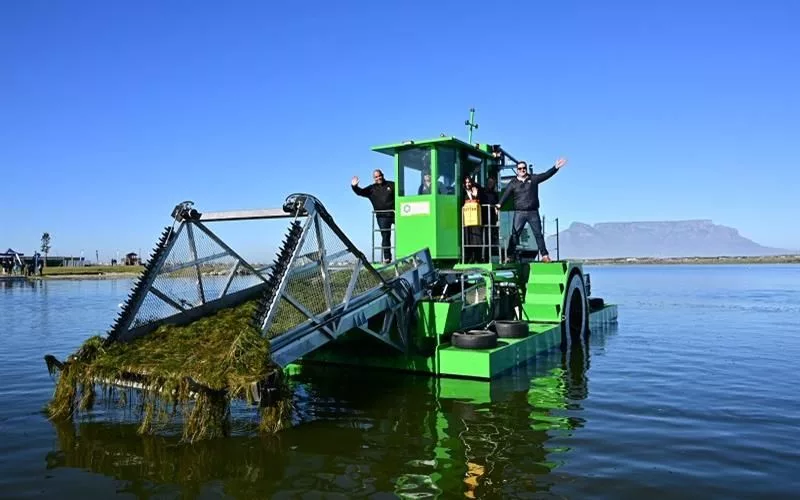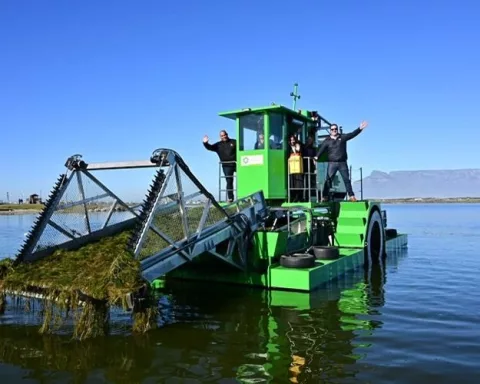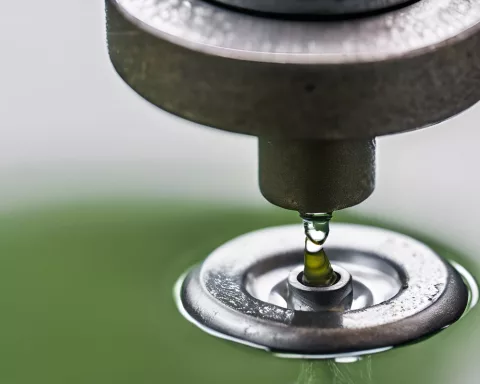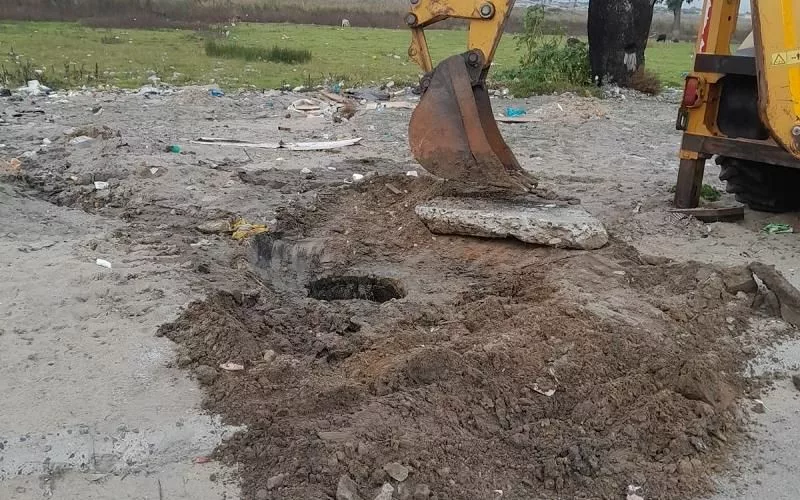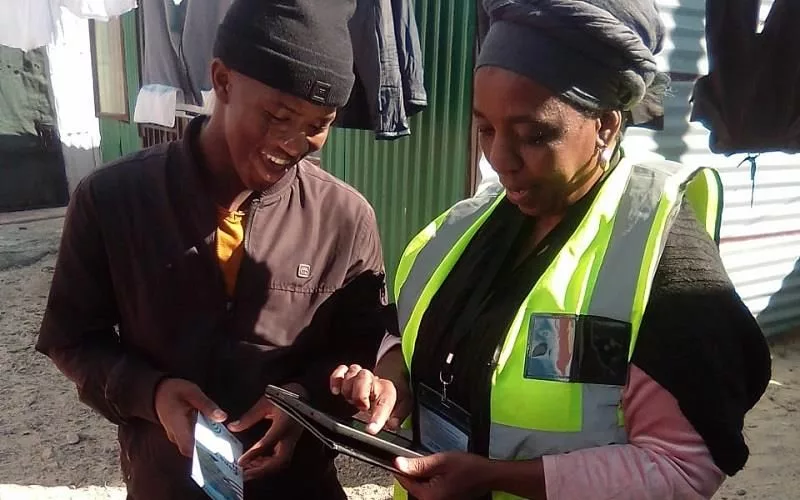Meet Otter, a weed harvester designed to keep Cape Town’s water bodies healthy and clean. Equipped with underwater blades, it is responsible for controlling the growth of Sago Pondweed, removing algal mats, and refining water quality. Otter is a breakthrough in eco-friendly water management and a triumph of local craftsmanship, contributing to the city’s dedication towards preserving and enhancing its water bodies.
The Otter Weed Harvester: A Breakthrough in Eco-friendly Water Management
Discover Otter, Cape Town’s innovative weed harvester designed to combat water weeds and sustain the quality of water bodies. Equipped with underwater blades, Otter is responsible for controlling the growth of Sago Pondweed, removing algal mats, and refining water quality. Otter’s mission is to enhance environmental health while stimulating local economies supported by water resources.
Otter: Cape Town’s Cutting Edge Solution to Weed Overgrowth
The shimmering waters of Rietvlei, a beloved recreational destination nestled in the core of the Table Bay Nature Reserve, recently vibrated with the subtle buzz of an innovative watercraft. Named “Otter,” this dedicated weed harvester has become a crucial part of Cape Town’s strategy to combat the nuisance of water weeds and sustain the quality of its water bodies.
During a beautiful sunny day, the Mayor of Cape Town, Geordin Hill-Lewis, and Deputy Mayor Eddie Andrews celebrated the inclusion of Otter in their fleet. This move was seen as an innovative leap in managing the environment of Rietvlei. The Otter, specifically designed for this task, comes equipped with underwater blades meant to cut and collect aquatic weeds. This trimming activity not only improves the water quality but also makes navigation easier for recreational purposes.
The mission of the Otter, however, isn’t absolute weed annihilation. For the water body to function healthily, certain types of algae need to be present. As such, some areas will remain unaffected by the weed harvester activities to maintain this delicate equilibrium.
Tackling Sago Pondweed and Water Quality Optimization
A key aspect of Otter’s operation includes the fight against the stubborn Sago Pondweed. Urban systems often result in a condition known as eutrophication, characterized by an excessive nutrient load. While Sago Pondweed absorbs these surplus nutrients, it reintroduces them into the water body upon its death. Hence, controlling its growth is a vital part of the mitigation strategy.
Additionally, the Otter is responsible for removing the accumulation of filamentous algal mats that surface during the summer months. This action further refines the water quality, ensuring a healthy aquatic environment.
A History and Future of Effective Water Weed Management
The Otter isn’t Cape Town’s initial venture into the world of specialized weed harvesters. Previously, in December 2023, Zandvlei had the honor of hosting the first weed harvester, with another one planned for delivery in 2025. As Deputy Mayor Eddie Andrews highlighted, these vessels not only enhance the environmental health of the water bodies but also play a significant role in stimulating the local economies supported by these water resources.
Furthermore, the Deputy Mayor revealed the ambitious blueprints of the Spatial Planning and Environment Directorate. An estimated budget of around R408 million is being allocated for the restoration of water bodies over the upcoming three fiscal years. This includes job creation through the river wardens program, upgrading the water quality at Rietvlei, Zeekoevlei, Milnerton Lagoon, and Zandvlei, and procuring a third brand-new weed harvester for Zandvlei.
A Triumph of Local Craftsmanship
The Otter, a testament to local artistry, was closely supervised by the City’s Fleet Management Department to guarantee its punctual delivery. Alderman Theresa Uys, the City’s Mayoral Committee Member for Corporate Services, expressed a deep sense of pride. She highlighted that this highly specialized vessel was constructed right here in Cape Town, further contributing to local pride and economy.
As the Otter embarked on its crucial mission, the Mayor and Deputy Mayor, alongside officials from the City’s Environmental Management Department, watched with evident enthusiasm. However, the maiden voyage of the Otter was more than just a ship launch; it symbolized a reaffirmed commitment to environmental conservation. It stands as proof of the city’s dedication towards preserving and enhancing its water bodies for the pleasure and advantage of all residents and visitors alike. The Otter Weed Harvester is indeed a revolutionary stride in environmental management, boosting the city’s efforts to yield a more sustainable and eco-friendly future.
1. What is the Otter Weed Harvester?
The Otter is a specialized watercraft designed to combat the growth of Sago Pondweed, remove algal mats, and refine water quality in Cape Town’s water bodies. It is equipped with underwater blades to cut and collect aquatic weeds.
2. What is the Otter’s mission?
The Otter’s mission is to enhance environmental health while stimulating local economies supported by water resources. It is a breakthrough in eco-friendly water management and a triumph of local craftsmanship.
3. What is Eutrophication and how does Sago Pondweed combat it?
Eutrophication is characterized by an excessive nutrient load in urban systems. Sago Pondweed absorbs these surplus nutrients, which reintroduces them into the water body upon its death. Hence, controlling its growth is a vital part of the mitigation strategy to combat eutrophication.
4. What is the history of specialized weed harvesters in Cape Town?
Cape Town has previously deployed specialized weed harvesters in Zandvlei, with another one planned for delivery in 2025. The weed harvesters not only enhance the environmental health of the water bodies but also play a significant role in stimulating the local economies supported by these water resources.
5. What is the budget allocated for the restoration of water bodies in Cape Town?
An estimated budget of around R408 million is being allocated for the restoration of water bodies over the upcoming three fiscal years. This includes job creation through the river wardens program, upgrading the water quality at Rietvlei, Zeekoevlei, Milnerton Lagoon, and Zandvlei, and procuring a third brand-new weed harvester for Zandvlei.
6. Who constructed the Otter Weed Harvester and what does it symbolize for Cape Town?
The Otter is a testament to local artistry and was constructed in Cape Town. Its maiden voyage symbolized a reaffirmed commitment to environmental conservation and the city’s dedication towards preserving and enhancing its water bodies for the pleasure and advantage of all residents and visitors alike.

